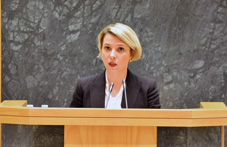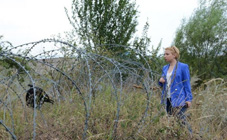
The hearing of Public Defender was held in the Parliament
By Tsotne Pataraia
Friday, September 20
At the plenary sitting, the Parliament of Georgia heard the 2018 report of the Public Defender, Nino Lomjaria, themed “State of Protection of Human Rights and Freedoms”.
Lomjaria has drawn particular attention to problems regarding ongoing high-profile criminal cases, institutional problems in justice, media environment, minorities, etc. in her report presented in parliament earlier today.
The report places a great deal of emphasis on high-profile cases. It begins with a discussion of the right to life and first of all examines the proportionality of the force used against Temirlan Machalikashvili (Pankisi Gorge native, killed by the special forces). The Public Defender believes that Parliament should use all supervisory leverage to determine the truth of the matter. In the context of the Right to Life, significant gaps in the materials of the investigation into the murder of the first President of Georgia, Zviad Gamsakhurdia, are also discussed.
This part of the report also deals with about investigating the fact of Vano Merabishvili's (former PM of Georgia) removal from prison and the investigation of the murder on Khorava Street (two teenagers were brutally murdered). According to Nino Lomjaria, the investigation tactics may not serve the public interest in identifying all persons involved in the crime. The Public Defender notes that his recommendation to initiate an investigation under Article 20 of the Criminal Code has not been fulfilled.
In addition, Nino Lomjaria said lawmakers often have questions about ongoing criminal cases, what information the Ombudsman holds, but the Public Defender does not have access to criminal records to assess the progress of the investigation: "Unfortunately, despite our efforts, the Georgian Parliament did not support the bill that we had more access to ongoing criminal cases," the Ombudsman said.
Concerning the realization of freedom of assembly, the main problem is the practice of law enforcement officers restricting the ability to place temporary structures and the ineffective management of counter-demonstrations. As Lomjaria noted, the events of June 20-21 revealed new pressing issues:
“I would like to inform you that in addition to the Ombudsman observing directly how the Prosecutor's Office is investigating allegations of alleged ill-treatment and abuse of power (facts related to the events of June 20-21), not only recommendations, but also drafts of specific legal acts will be prepared to ensure that interference with the right to assembly is in line with internationally recognized human rights standards,” Nino Lomjaria said.
As Ombudsman declared, the practice of protecting the right to equality reveals that in many cases stereotypes and misconceptions about vulnerable groups that are discriminated and less appropriate measures are taken by the state to overcome the problems. According to the Public Defender, gender equality remains a challenge. In terms of women's economic empowerment and labor rights, the situation has not improved substantially. In 2018, 22 incidents of murder of women were revealed, 7 of them for a domestic crime. Of the 18 cases of attempted murder of women, 11 were committed in domestic crime. 10 of them relate to her husband's attempted murder. She said it was important for the country to have mechanisms for economic support for women victims of violence:
“The main problem concerning violence against women is that there are no economic incentives and support mechanisms for female victims of violence,” Nino Lomjaria stated.
With regards to the legal status of LGBT + persons, she declares that the situation has not changed substantially. Homophobia and the influence of anti-gender groups are still strong in society, leaving these people still suffering oppression, discrimination, and violence. The practice of the Public Defender's Office shows that ethnic and racial inequality is still a pressing problem. The issue of effective and timely response to the crime of religious intolerance has not been resolved for years with regard to restitution of historical property, violations in the field of education and inequalities, and crimes of religious intolerance.
According to the Public Defender, the existence of a healthy media environment remains a challenge (the state has not yet investigated the disappearance of Azerbaijani journalist Afgan Mukhtarli) and institutional problems in judiciary system are increasing, special attention was paid to the selection process of judges of the Supreme Court.
The Public Defender's report refers to the grave situation in the occupied territories and the legal situation of IDPs:
“I would say that the human rights situation in the occupied territories is getting worse from year to year. We speak in great detail about the cases of Georgian citizens' lives, security, access to health care, education, violation of children's rights, restrictions on the right of movement and ethnic discrimination along with the occupied territories and the occupation line. Their socio-economic situation is very grave,” said Lomjaria.
The Public Defender's report also emphasizes ineffective labor safety legislation, separate chapters deal with the rights of children, persons with disabilities and the elderly. national minorities and civil integration. The report also assesses the realization of voting rights, a strongly negative campaign for the presidential election, various violent incidents following the pre-election period, and cases of hate speech.
The document presented by Nino Lomjaria has a total of 447 pages, according to which there were 8 480 applications in the Public Defender's Office in 2018 and 6 063 hotline calls. During 2018, the Public Defender's Office prepared 11 special reports.


